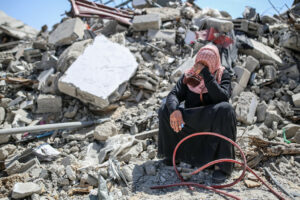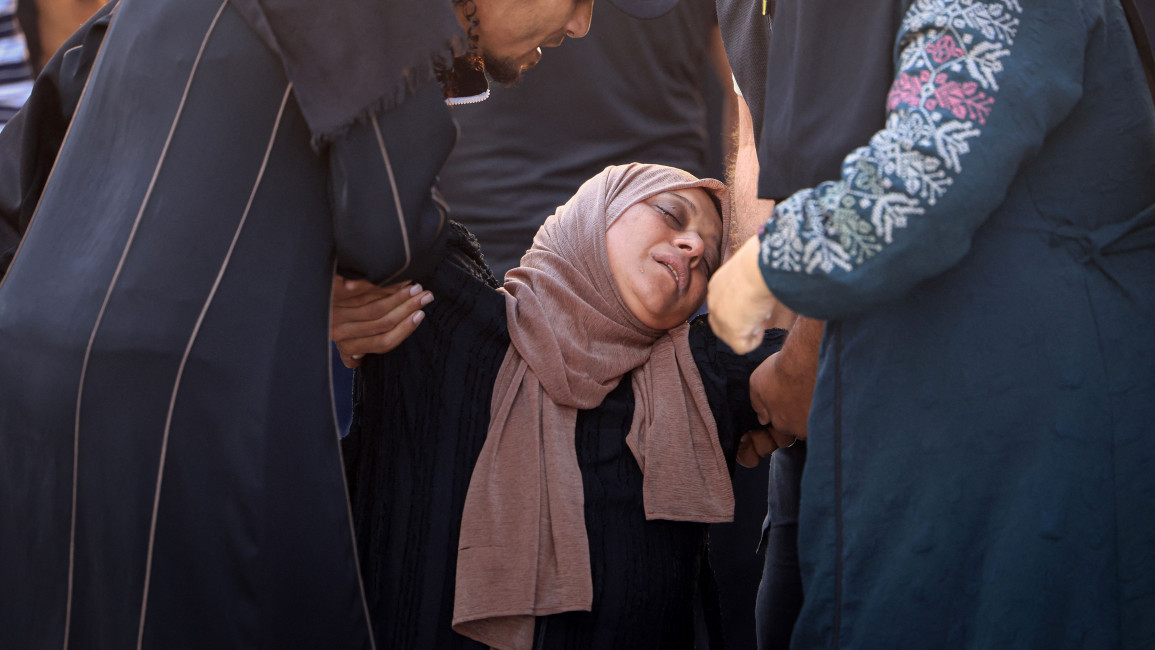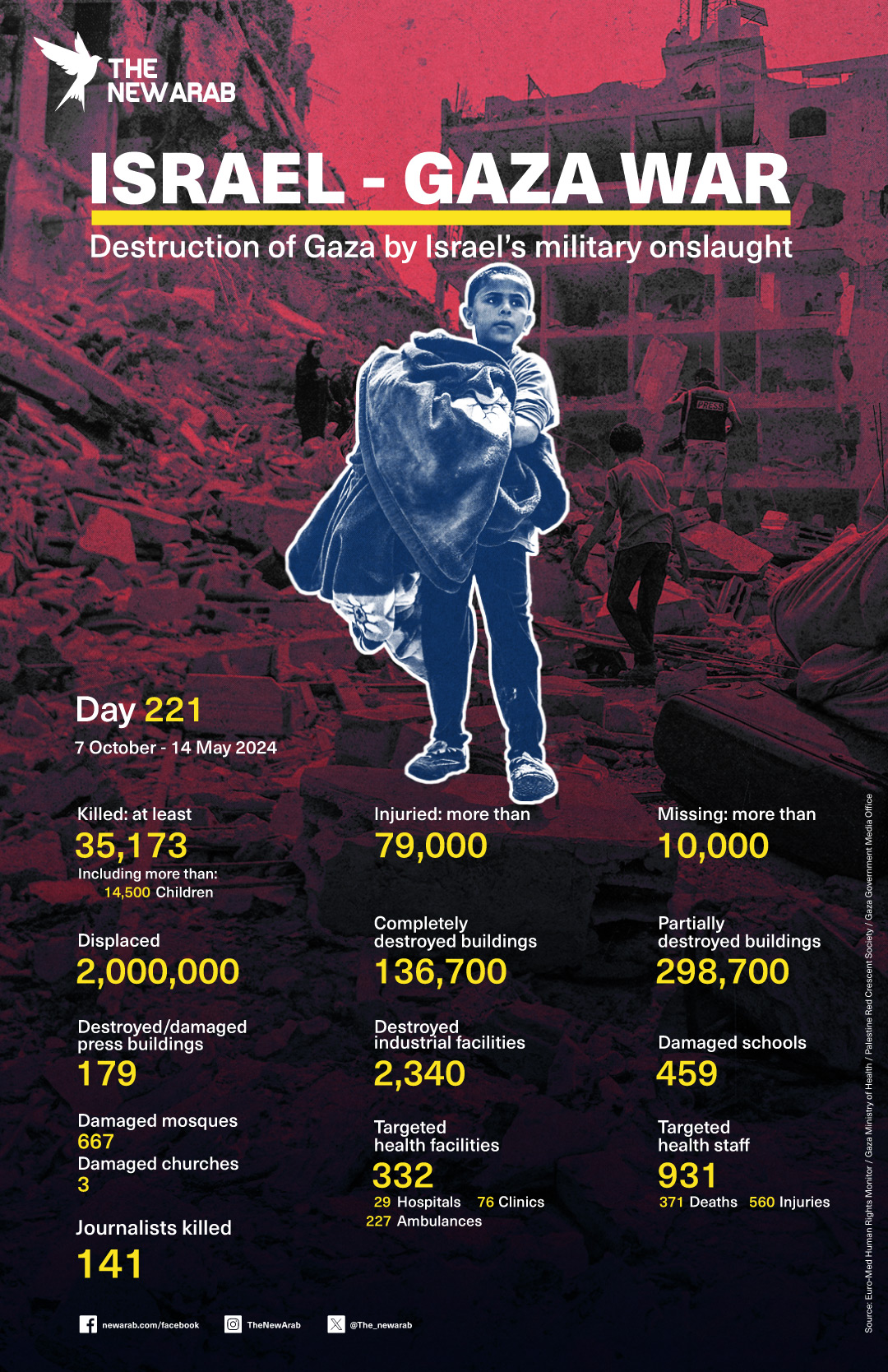‘Where are the voices?’: A deafening silence from the West’s white feminists on Gaza

With their continued silence on Gaza, the selectiveness of white mainstream feminists shows that for them, some lives are worth talking about more than others.
The New Arab, Yousra Samir Imran
14 May, 2024
More than seven months into Israel’s indiscriminate bombing and targeting of Palestinian civilians in Gaza, the only thing the world has heard from many of the West’s white mainstream feminists is… crickets.
Yet, these same feminists have taken a public stance on the rest of the world’s injustices, speaking up on everything from the Earth’s climate emergency to the Iranian government’s crackdown on women who do not want to wear the hijab.
Western feminists were the first to speak up when the Taliban seized control of Afghanistan in 2021 and used all their platforms to express their outrage about the reversal of Roe vs. Wade in 2022.
Recently, when the 2023 movie Barbie did not take home any Oscars in March, they considered it a loss for feminism.
They have something to say about everything – everything except Gaza.
Yes, there have been some white Western feminist figures who have taken a public stance and used their platforms to raise awareness about Gaza such as Greta Thunberg and Charlotte Church, but unfortunately, they are in the minority.
With their continued silence, white mainstream feminists suggest to the world that their activism is selective and that some lives are worth talking about more than others.
For Palestinian women, white mainstream feminists’ silence on Gaza has not come as a surprise, but it has still been hurtful and disappointing.
“Where are the voices speaking out for the countless mothers in Gaza who face daily loss and devastation… Are we not deemed worthy of their attention and support? Are we not civilised enough to be seen and heard?”
Rasha Abushaban is a Palestinian human rights worker who was recently evacuated from Gaza. She has lost her brother and countless loved ones since October 2023; her home was destroyed and she was displaced numerous times.
Rasha says that while she was in Gaza fleeing from one temporary shelter to another, she often thought about the silence of Western feminists.
“Where are the voices speaking out for the countless mothers in Gaza who face daily loss and devastation or for those who were killed? What about those who have suddenly found themselves assuming the role of sole providers for their families after the loss of husbands or male relatives?” Rasha asks while talking to The New Arab.
“And what of the injustices faced by women in Israeli prisons, including reports of rape, harassment and humiliation? The women who endured childbirth without anaesthesia in the most challenging circumstances, with minimal support for both herself and her baby, amid shortages of essential items like milk and diapers for newborns?
“As a displaced woman struggling to access basic necessities like privacy, sanitary products, and adequate hygiene facilities, I can’t help but question why the global feminist community seems to overlook our suffering. Are we not deemed worthy of their attention and support? Are we not civilised enough to be seen and heard?”
“The hypocrisy of white Western feminism has never been clearer and in my opinion, this silence is rooted in the belief that Muslims are inherently different, ‘backwards’ and ‘violent’”
It is this inherent belief of neoliberal and post-neoliberal Western feminists in Arab and Muslim women being “uncivilised” that British Libyan journalist and author of The Othered Woman: How White Feminism Harms Muslim Women,Shahed Ezaydi says is at the root of their silence on Gaza and their refusal to show support for Palestinian women.
“The hypocrisy of white Western feminism has never been clearer and in my opinion, this silence is rooted in the belief that Muslims are inherently different, ‘backwards’ and ‘violent,’ (thereby dehumanising Palestinians, especially men), and don’t align with Western values. They’re not seen as worthy of empathy or help, even when a genocide has been happening before our eyes for months,” Shahed tells The New Arab.

“I know a lot of people were unsurprised by many feminists’ silence when it comes to Gaza, but a small part of me did think that the severity and gravity of the violence would mean there would be some sort of acknowledgement or advocacy, but no.
“Feminism in the West will happily speak up for Black, brown and Muslim women when it fits within their own narrative. We saw how women around the world stood in solidarity with Iranian women as they continued to fight back against an oppressive regime, as they should. But where is this same energy for Palestinian women?”
Egyptian-American feminist and author of The Seven Necessary Sins for Women and Girls, Mona Eltahawy, famously uses the allegory of an octopus to represent the patriarchy.
“The octopus has many tentacles, each of which represents a form of oppression that affects men and women world-over, such as classism, racism, ableism and homophobia,” Mona says.
To be a feminist means to fight against the patriarchy and all its forms of oppression. With their refusal to acknowledge and stand up against a settler-colonialist state engaging in an apartheid system and ethnic cleansing, white mainstream feminists in the West have failed the very definition of feminism.
According to Dana Habayeb, a Palestinian activist and founder of Faith Consulting, an online mental health platform for Muslims, what Western feminists view as feminism and what the rest of the world does are two different things, and the silence of Western white feminists is partly due to their rejection of ways of life and values that they view as different or incompatible to theirs.
“Just because people put a label on themselves doesn’t mean they actually are that, and then there are people who don’t label themselves as feminists but are feminists down to their core,” Dana explains.
“There are a lot of true feminists that have stood up and talked for women in Palestine that don’t necessarily assign themselves that label; labels mean nothing without action. Without action you’re not a feminist – without that drive to speak for women across the board, regardless of whether they are in line with your values, your beliefs, your skin colour, your background, that’s a true feminist,” Dana tells The New Arab.
“This concept of Western values being universal values deters from people taking positive action because they feel like they need to apply these values across other cultures. There also needs to be a widening of scope and understanding of what universal values are, what personal values are, when those things should overlap and when you should take action regardless of how the other person wants to live their life.”
Because of the many tentacles of oppression that Palestinians endure under Israeli occupation, Palestine is and always will be a feminist issue.
Just a snapshot of what is currently happening to Palestinian women in Gaza: more than 9,000 women have been killed by the Israeli army, while those who have survived are giving birth without painkillers, undergoing Caesarean-sections without anaesthetic, menstruating without access to toilets, sanitary towels or water, while many others are being unlawfully detained by the Israeli army, treated degradingly and forced to strip.
While all this should have been a cause for uproar by feminists worldwide, the only thing white mainstream feminists can seem to muster energy for is the misogynistic hate against Taylor Swift and women’s football.

White mainstream feminism’s inability to put a value on Palestinian life is something that British Libyan journalist and author Nadeine Asbali explores in depth in her book Veiled Threat.
For Nadeine, their silence on Gaza has cemented the feeling that their brand of feminism was not created for someone like her – an Arab and Muslim woman.
“Their silence shows how tightly woven they are with racism and Islamophobia and how white mainstream feminism needs there to be a hierarchy of women. It needs Muslim women to be on the bottom so that they can assert their superior, liberal, progressive values above us”.
According to Nadeine, white Western feminism serves the West’s ongoing imperialist world order and the two are co-dependent, so white mainstream feminists have nothing to personally gain by being vocal or supportive of Palestinian women.
“White mainstream feminism exists to prop up the Western liberal world order that is an extension of imperialism and white supremacy,” says Nadeine.
“Their silence shows how tightly woven they are with racism and Islamophobia and how white mainstream feminism needs there to be a hierarchy of women. It needs Muslim women to be on the bottom so that they can assert their superior, liberal, progressive values above us; so, in a situation like this with what is happening to the women in Gaza, they’re silent on it because it’s not convenient for them to call it out.
“They rely on that Western liberal world order to exist, and when there’s evidence of that world order being murderous and colonial, then they’re not interested in it and they look the other way.”
For Palestinian American author of Behind You Is The Sea, Susan Muaddi Darraj, white mainstream feminism’s silence on the current genocide in Gaza is not only another betrayal of non-white women, but it has also made their selective feminism as clear as day.
Gaza has changed the world irrevocably, opening millions of people’s eyes to the reality and brutality of Israeli settler colonialism in Palestine, and according to Susan, white mainstream feminists will be the ones to be left behind.
“A word to pseudo-feminists who ignore Palestine: This paradigm shift is happening and does not depend on you in any way. We simply don’t need you and will not wait for you to understand. Educate yourself and catch up, or get left behind.”
Yousra Samir Imran is a British Egyptian writer and author based in Yorkshire. She is the author of Hijab and Red Lipstick, published by Hashtag Press
Follow her on Twitter: @UNDERYOURABAYA